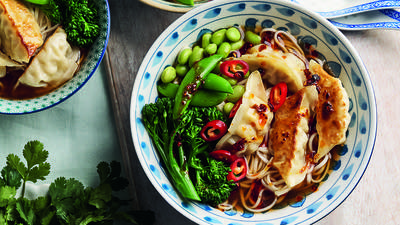
Chef Jiho Kim, of Joomak in New York City, makes highly technical, Korean-inspired fine dining at work. But at home in the summer, he loves to relax with a casual chilled “salad” of daikon radish shaved into “noodles” with a spiralizer, topped with raw marinated fish, kimchi, and a broth made from steeping buckwheat in dashi, a quick broth that’s key in Japanese cuisine.
Make as many or as few of the components below; as long as you have the broth and the radish noodles and a savory topping, you’ll have a light, refreshing, deeply flavored dish.
Soba Dashi
Makes about 2 cups
2 cups water
3 tea bags toasted soba tea
¼ cup dried shiitake mushrooms
2 leaves kombu
1 cup (loosely packed) bonito flakes
Soy sauce, to taste
Brown sugar, to taste
Bring the water to a boil in a medium saucepan with the soba tea, mushrooms and kombu, then lower the heat to low and simmer gently, covered, for 30 minutes. Add the bonito flakes, turn off the heat, and steep for 5 to 10 minutes. Strain and season with soy sauce and brown sugar, to taste. Let cool.
Daikon Radish Salad
Serves 2 to 4
1 small daikon radish
Shiro dashi, or as needed (see note)
Ponzu sauce, or as needed (see note)
Note: Shiro dashi is a concentrated dashi, used as a seasoning; ponzu is a sauce of soy sauce, dashi, and yuzu citrus. Both are available online or in Asian markets.
Using a spiralizer or other thin shredder, shred the daikon into delicate noodles. Season the daikon “noodles” to taste with the shiro dashi or ponzu, keeping in mind that you will add the soba dashi later.
White Kimchi Dongchimi
Makes about 3 quarts
1 head Napa cabbage
½ pound daikon, sliced thin
⅓ cup Diamond Crystal kosher salt (half if using Morton)
1 medium Asian pear, peeled and cored
4 garlic cloves
½ cup sliced onion
1 teaspoon fresh grated ginger
4 cups water
1 bunch scallion, cut into 3-inch pieces
Cut the cabbage into 2-inch pieces and place in a large bowl with the daikon. Add the salt and gently massage to make sure all the vegetables are well-salted. Let sit for 5 to 8 hours.
Rinse the cabbage and daikon thoroughly and drain excess water.
To make the brine, blend the pear, garlic, onion, and ginger with the water. Strain the mixture and pour it over the Napa cabbage and daikon. Add the scallion.
Refrigerate for 3 to 5 days before serving.
Cured Fluke
Serves 2 – 4
½ cup sugar
½ cup Diamond Crystal kosher salt (¼ cup if Morton)
1 leaf kombu, broken into tiny pieces or pulverized in a blender
1 sashimi-grade fluke fillet
In a small bowl, combine sugar, salt, and kombu.
Sprinkle the mixture evenly over the fluke fillet.
Cure for 30 minutes, then rinse and pat dry. Keep chilled. Slice into thin slices for serving
Soy-Cured Salmon
Serves 4 to 8
1 cup water
1 cup soy sauce
1/2 cup sugar
1 onion, sliced
3 scallions, sliced
3 garlic cloves, minced
1 pound sashimi-grade salmon filet
Bring the water, soy sauce, and sugar to a boil in a small saucepan. Let it cool to room temperature, then pour the mixture over the salmon filet, set in a container. Cover and let it marinate / cure overnight in the refrigerator.
Remove the salmon from the marinade and pat dry with paper towels. Slice into thin slices for serving.
Assembly
1 cup shredded daikon salad per serving
½ cup soba dashi, chilled
White kimchi, to taste
Cured fluke, as desired
Soy-cured salmon, as desired
Place the shredded daikon in a shallow bowl and pour dashi over. Top as desired with white kimchi, and fish slices.
Before you go...
Each week, The Splendid Table brings you stories that expand your world view, inspire you to try something new, and show how food connects us all. We rely on your generous support. For as little as $5 a month, you can have a lasting impact on The Splendid Table. And, when you donate, you’ll join a community of like-minded individuals who love good food, good conversation, and kitchen companionship. Show your love for The Splendid Table with a gift today.
Thank you for your support.
Donate today for as little as $5.00 a month. Your gift only takes a few minutes and has a lasting impact on The Splendid Table and you'll be welcomed into The Splendid Table Co-op.



